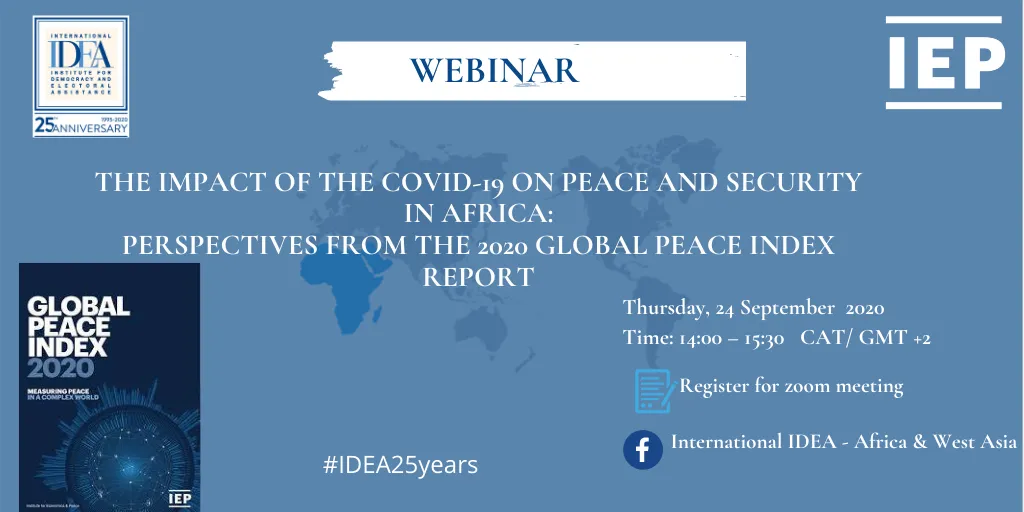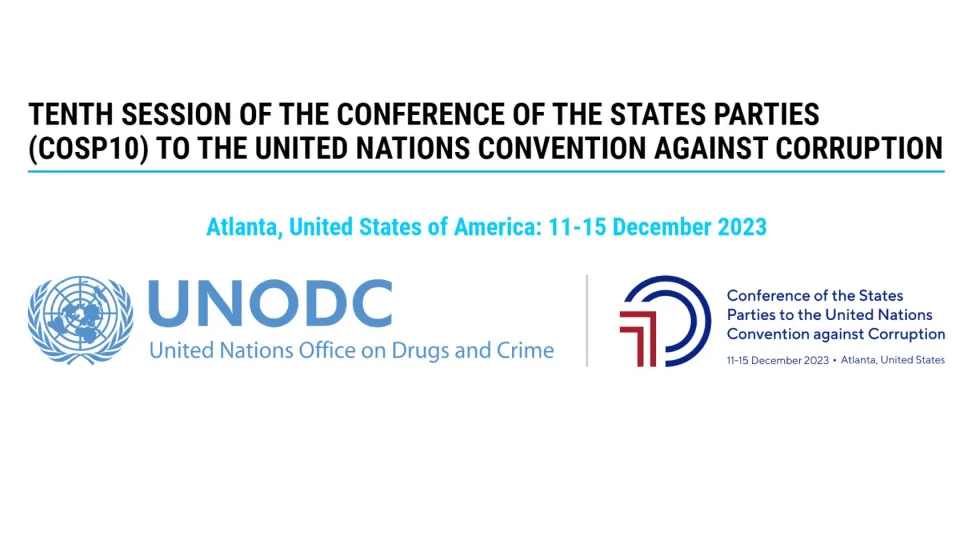The Impact of the COVID-19 on Peace and Security in Africa: Perspectives from the 2020 Global Peace Index Report

The Global Peace Index is the flagship annual report produced by the Institute for Economics and Peace (IEP). This year’s report is the 14th edition of the Global Peace Index (GPI), which ranks 163 independent states and territories according to their relative levels of peacefulness. The GPI is the world’s leading measure of global peacefulness.
This report presents the most comprehensive data-driven analysis to date on peace—its economic value, trends and how to develop peaceful societies. The 2020 report is an authoritative, editorially independent, and evidence-based annual ranking of 163 of the world’s countries according to their relative levels of peace. The report also provides high-level analysis and insight incorporating the most pressing factors affecting the world’s peacefulness and which have a bearing on peace in the future, published by the IEP.
The GPI covers 99.7 per cent of the world’s population, using 23 qualitative and quantitative indicators from highly respected sources and measures the state of peace using three thematic domains: the level of Societal Safety and Security; the extent of Ongoing Domestic and International Conflict; and the degree of Militarisation. In addition to presenting the findings from the 2020 GPI, the GPI includes analysis of trends in Positive Peace: the attitudes, institutions, and structures that create and sustain peaceful societies.
RELEVANCE TO AFRICA
Africa recorded a slight fall in peacefulness on the 2020 GPI, with an overall score deterioration of 0.5 per cent. Twenty countries in the region improved in peacefulness while 24 deteriorated. Disputes over election results and demands for political change have led to civil unrest and political instability in several countries across the region, with violent protests breaking out in many countries over the past year. Benin experienced the biggest deterioration of any country in the world, falling 34 places in the ranking to 106th on the 2020 GPI. The region’s three largest improvers in peacefulness in the last year were South Africa, Cote d’Ivoire and Equatorial Guinea, all of which recorded improvements of more than six per cent.
Based on empirical data, scientific measurement and high-quality analysis, the GPI performs the following relevant functions:
- Examines the indicators and drivers relating to violence and peace in the world—including Africa and its sub-regions—thus allowing countries and other partners to identify and mitigate against risk factors;
- Focuses on the factors, challenges and opportunities relating to peace, conflict and economic flourishing with focus on individual countries and their respective regions. Special attention is given to the unique vulnerabilities of certain nations;
- Offers a comprehensive account of emerging factors such as climate change, pestilential threats and political developments;
- Aligns peace metrics to economic performance and other national development priorities such as the SDGs; and
- Makes the case for Positive Peace and other forward-looking frameworks proven to have beneficial impact on economic and human development through reducing conflict and its negative consequences.
Drawing on a well-tested model and with 13 previous editions completed, the GPI Report reliably monitors global and national trends and progress towards attaining sustainable peace. The 2020 GPI Report aims to provide an indispensable technical tool to support the activities and interventions of government, business, financial institutions and local actors. In Africa, this holds even higher potential as a tool for accelerating the integration agenda and Agenda 2063.
OBJECTIVES
Grounded in the evidenced-based findings of the 2020 GPI, the aims of the webinar will be:
- To create a platform for peace and security dialogue which communicates with policymakers and decision makers from African governments, African Union, Regional Economic Communities, academia and civil society;
- To reflect on the findings of the 2020 GPI on COVID-19 and its impact on peace and security; and
- Share key evidence-based recommendations and reflections from the Report relevant to various stakeholders.
TARGET GROUP
African Union, regional economic communities, government ministries and departments, regional commissions, inter-governmental organizations, think-tanks, UN agencies, international NGOs, CSOs, academic institutions and media agencies.
Draft Programme
DATE: Thursday, 24 September 2020.
TIME: 14:00 – 15:30 (CAT)
13:50 - 14:00 |
All participants and Facilitator |
Logging in. |
14:00 – 14:05 |
International IDEA Senior Programme Officer, Africa and West Asia – Gram Matenga |
Welcome and Introduction to webinar and Panelists |
14:05 - 14:10 |
International IDEA Regional Director for Africa and West Asia – Professor Adebayo Olukoshi |
Opening Remarks |
14:10 - 14:30 |
IEP Director for Africa – Mr Trust Mamombe |
2020 GPI and COVID-19 Report; Key findings |
14:30 - 14:45 |
Head of Division, Conflict Prevention and Early Warning - Ambassador Fred Ngoga |
Reflections on 2020 GPI and COVID-19 |
14:45 - 15:00 |
Ambassador Michelle Ndiaye, Peace and Security Expert (TBC) |
Reflections on 2020 GPI and COVID-19 |
15:00 - 15:25 |
Plenary Session |
Question and Answer session |
15:25 - 15:30 |
International IDEA |
Concluding Remarks/Recommendations/ Way Forward |
15:30 |
**END** |

